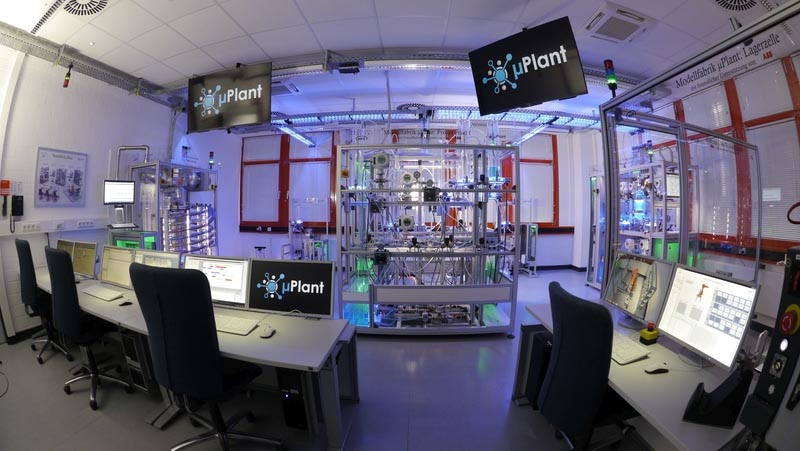This page contains automatically translated content.
Uni Kassel simuliert Fabrik der Zukunft
 Image: University of Kassel
Image: University of KasselIn intelligenten Fabriken liegt enormes Potenzial für die deutsche Wirtschaft: Nach einer Studie des Branchenverbands BITKOM und das Fraunhofer-Institut für Arbeitswirtschaft und Organisation IAO könnte die Bruttowertschöpfung alleine im Maschinen- und Anlagenbau von rund 77 Milliarden Euro (2013) bis 2025 auf rund 100 Milliarden Euro steigen. Doch bisherige Umsetzungen reizen die Möglichkeiten noch nicht aus und sind häufig fehleranfällig.
Die heute in Kassel eingeweihte Modellfabrik trägt dazu bei, die Industrie 4.0 ins Laufen zu bringen. Sie ermöglicht es, vollautomatische Produktionsabläufe abzubilden und Methoden etwa zur Prognose von Fehlern in einer automatisierten, vernetzten und heterogenen Fabrik zu erforschen. So lassen sich gezielt kritische Situationen provozieren, beliebig oft wiederholen, analysieren und Methoden zur Verbesserung entwickeln.
Die Modellfabrik besteht aus sechs miteinander kommunizierenden Stationen sowie mobilen Robotern und einem Leitstand, von dem aus die Anlage überwacht wird. Den Fertigungsprozess bildet die Anlage vom Zusammenfügen erster Komponenten bis zur Einlagerung des Endprodukts ab. Den Transport der Ausgangs- und Zwischenprodukte übernehmen Roboter. In ihrer Form ist die Anlage in Deutschland einzigartig: „Im Gegensatz zu Anlagen anderer Hochschulen kann unsere Modellfabrik mehr heterogene Prozesse abbilden, und die Fertigungsinseln sind untereinander flexibel verknüpfbar“, erklärt Prof. Dr. Andreas Kroll, Leiter des Fachgebiets Mess- und Regelungstechnik. Auch der Einsatz mobiler Roboter sei andernorts selten.
„Die Anlage ermöglicht uns grundlagenorientierte ebenso wie anwendungsnahe Forschung“, so Kroll weiter. „Auch unsere Studierenden genießen dadurch eine Ausbildung auf Höhe der Zeit. Sie können direkt von unseren Fragestellungen profitieren.“
Die Anlage wurde seit 2013 sukzessive aufgebaut und bereits Anfang 2016 in einer vorläufigen Form in Betrieb genommen. In den vergangenen Monaten wurde die Fabrik durch eine zusätzliche Prozessinsel komplettiert. Alle Produktionseinrichtungen sind Eigenentwicklungen von Wissenschaftlern und Studierenden. Dadurch beschränkten sich die Kosten auf einen sechsstelligen Betrag. Die Simulation technischer Systeme ist einer der Forschungsschwerpunkte der Universität Kassel.
Bilder:
Zwei Prozessinseln mit Lagerzelle und Robotern (Foto: Uni Kassel):
http://www.uni-kassel.de/uni/fileadmin/datas/uni/presse/anhaenge/2016/_1110462.jpg
Leitstand (Foto: uni Kassel):
www.uni-kassel.de/uni/fileadmin/datas/uni/presse/anhaenge/2016/454_hell.jpg
Prof. Dr. Andreas Kroll (Foto: Andreas Fischer):
www.uni-kassel.de/uni/fileadmin/datas/uni/presse/anhaenge/2016/Kroll_0613.jpg
Diese Bilder sind für ein Jahr und nur im Zusammenhang mit dieser Presseinformation kostenfrei nutzbar.
Kontakt:
Prof. Dr. Andreas Kroll
Universität Kassel
Institut für Analyse und Regelung technischer Systeme (ISAC)
Fachgebiet Mess- und Regelungstechnik
Tel.: +49 561 804-3248
E-Mail: andreas.kroll[at]mrt.uni-kassel[dot]de